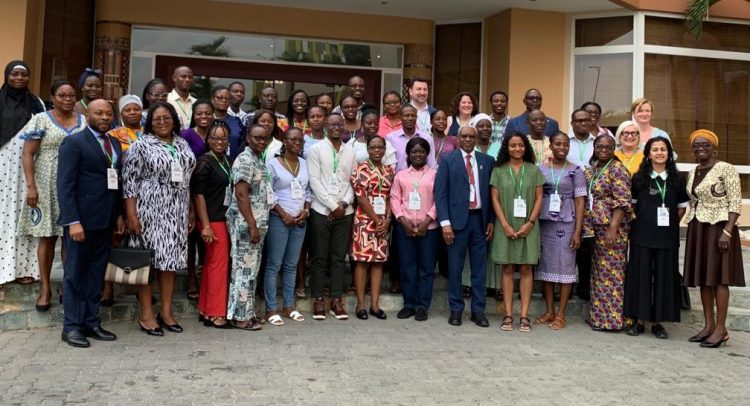Facilitators and participants in a group photograph
Health workers from five regions of the country have begun a-five-day capacity training on Emergency Medical Obstetrics and Neonatal Care (EMONC) in Accra.
The workshop is organised by Oxfam in Ghana in collaboration with the Ghana Health Services, Obstetricians and Gynecologists of Canada (SOGC), and Ghana (SOGOG).
Themed, “Improving maternal and newborn outcomes through improved EMONC coverage in Ghana” the training will engage 27 healthcare workers in areas such as family planning, adolescent-friendly healthcare services, how to use a human rights-based approach to solving issues of young women and adolescent girls, among others over the five days.
The participants according to the organizers were selected from eight districts within the Northern, North East, Bono East, Greater Accra, and Central regions.
Oxfam Programme Manager, Mohammed Mahamud said Oxfam through its project dubbed, “Power To Choose” has created strategies aimed at improving reproductive health education and maternal-child health to achieve zero maternal and child death.
“The training of our healthcare professionals is to help them adapt to the trends in providing services to pregnant women to strengthen healthcare delivery. This will also allow them to share the knowledge acquired with their colleagues,” he said.
President of the Society of Gynaecologists and Obstetricians of Ghana, Dr. Ali Samba, said the country over the years has seen a drop in maternal mortality from 800 to 300.
“We are delighted with the result but still think that as a country we can do better with reducing the maternal mortality. One of the ways we can strengthen EMONC is through training programmes,” he said.
He lamented that the recent brain drain in the midwifery society is affecting professional healthcare services saying, “The brain drain in our midwifery staff has hit the country significantly. Where you think you have people who have been trained in EMONC you go there and you cannot find anybody”.
Dr. Samba expressed gratitude to the supporting partners for the training programme, urging the facilitators to use different approaches to equip the participants.
Representative of SOGC, Laura Boujolly reaffirmed the organization’s commitment to improving sexual and reproductive care for women and adolescent girls in Ghana.
“We will provide hands-on multidisciplinary training and mentoring for healthcare professionals in Ghana to strengthen their skills in handling obstetric and newborn emergencies.
“At the end of this training our goal is to empower the healthcare participants who will in turn pick on the responsibility of impacting their knowledge and skills on other providers,” she said.
BY Prince Fiifi Yorke


